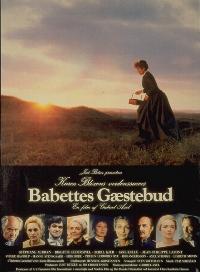 I like food. There, I’ve said it. In a society obsessed with either parceling out each meager calorie or splurging on sugary, prepackaged excess, Babette’s Feast is a delight of measured restraint, bounty, and artistry. Wait, am I talking about food anymore?
I like food. There, I’ve said it. In a society obsessed with either parceling out each meager calorie or splurging on sugary, prepackaged excess, Babette’s Feast is a delight of measured restraint, bounty, and artistry. Wait, am I talking about food anymore?Not really. On a number of levels, this leisurely film is very unusual. There’s a long period of set-up, as we learn about Martine (Birgitte Federspiel) and Filippa (Bodil Kjer), the beautiful daughters of a strict minister who lives on the coast of Jutland in Denmark (they’re named after Martin Luther and Philip Melanchton, if that tells you anything.)
We follow them as they are courted by a soldier and an opera singer, two wayward but sincere outsiders, wooed by the women's kindness and beauty. Ultimately, both sisters reject these men in their devotion to a simple life, lending this first act a feeling of regret and memory.
These memories spring up once again many years later when one of the erstwhile suitors sends Babette (Stephane Audran, Brideshead Revisited), a French refugee, to shelter with the two elderly sisters. Uncertain at first (after all, having a servant is an indulgence), Martine and Filippa grow to love Babette, who lends her cooking skills to their ministry. All of this is much welcomed by the congregation, who happily exchange gruel for thick, savory porridge.
It delves into questions of sacrifice and rejoicing, art and possession, generosity and joy. It is joy, the joy of giving, creating, and receiving, the joy of cooking and eating, which most defines the story, in the same way that the joy of running defined Chariots of Fire or the joy of flying Empire of the Sun, or the joy of fishing A River Runs Through It. And like the joy in those films, it is a palpable thing, an otherworldly ecstasy, and it allows the characters to work their way, without easy compromises, through a history of regret and sadness, into a future of hope.
All this in a film about cooking? Well, no. I’m not really talking about food anymore.
5/5 stars

Hannah Long
P.S. Fans of Carl Theodor Dreyer's Ordet may notice two members of the cast reunited in Birgitte Federspiel and Preben Lerdorff Rye.

No comments:
Post a Comment
Warning: blogger sometimes eats comments - make sure you copy your message before you post.